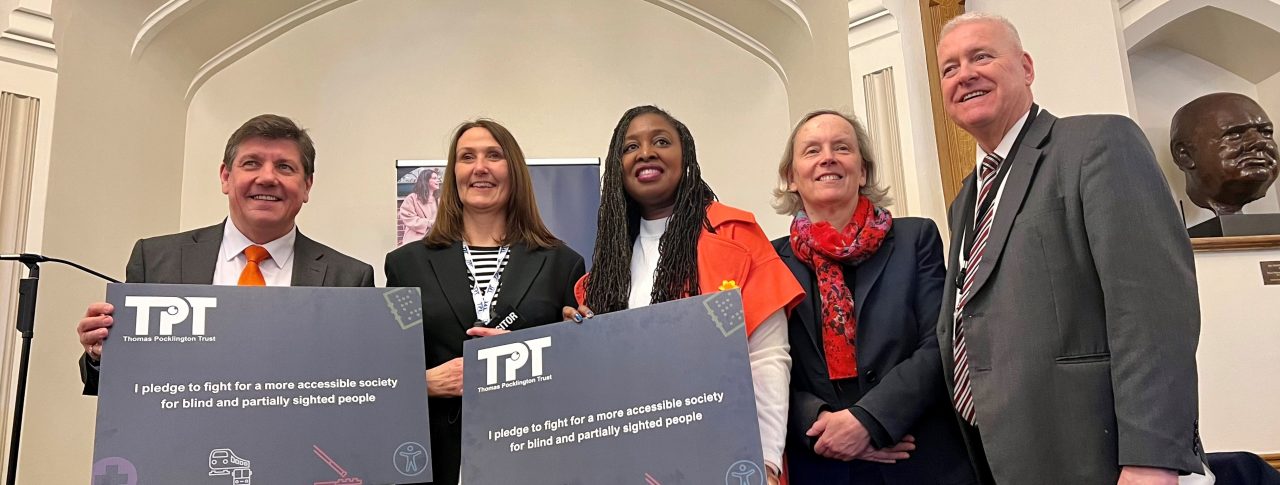‘Can you see us?’ – MP event success
Earlier this week, Sight Loss Councils joined Thomas Pocklington Trust (TPT) for their ‘Ask your MP: Can you see us?’ event at Westminster.
The event, hosted by Member of Parliament, Marsha De Cordova, aimed to highlight some of the current issues facing blind and partially sighted (BPS) people. MPs had the opportunity to experience some of these challenges first-hand by trying our simulation spectacles (sim specs), whilst carrying out a variety of tasks.
Sim specs are special glasses which mirror some of the various sight conditions many BPS people have. They give the wearer a unique insight into living with sight loss.
“It was great to host Thomas Pocklington Trust’s ‘Can You See Us’ event in Parliament on creating more accessible society for blind and partially sighted people.
“The event was incredibly powerful with MPs having the opportunity to speak with blind or partially sighted people about their challenges in accessing employment, education, transport, and voting.
“We need the government to commit to urgent actions that will create an inclusive and equitable society for people with sight loss.”
Marsha De Cordova, Member of Parliament
At the event, we asked MPs to take the Thomas Pocklington Trust pledge to fight for a more accessible society for blind and partially sighted people.
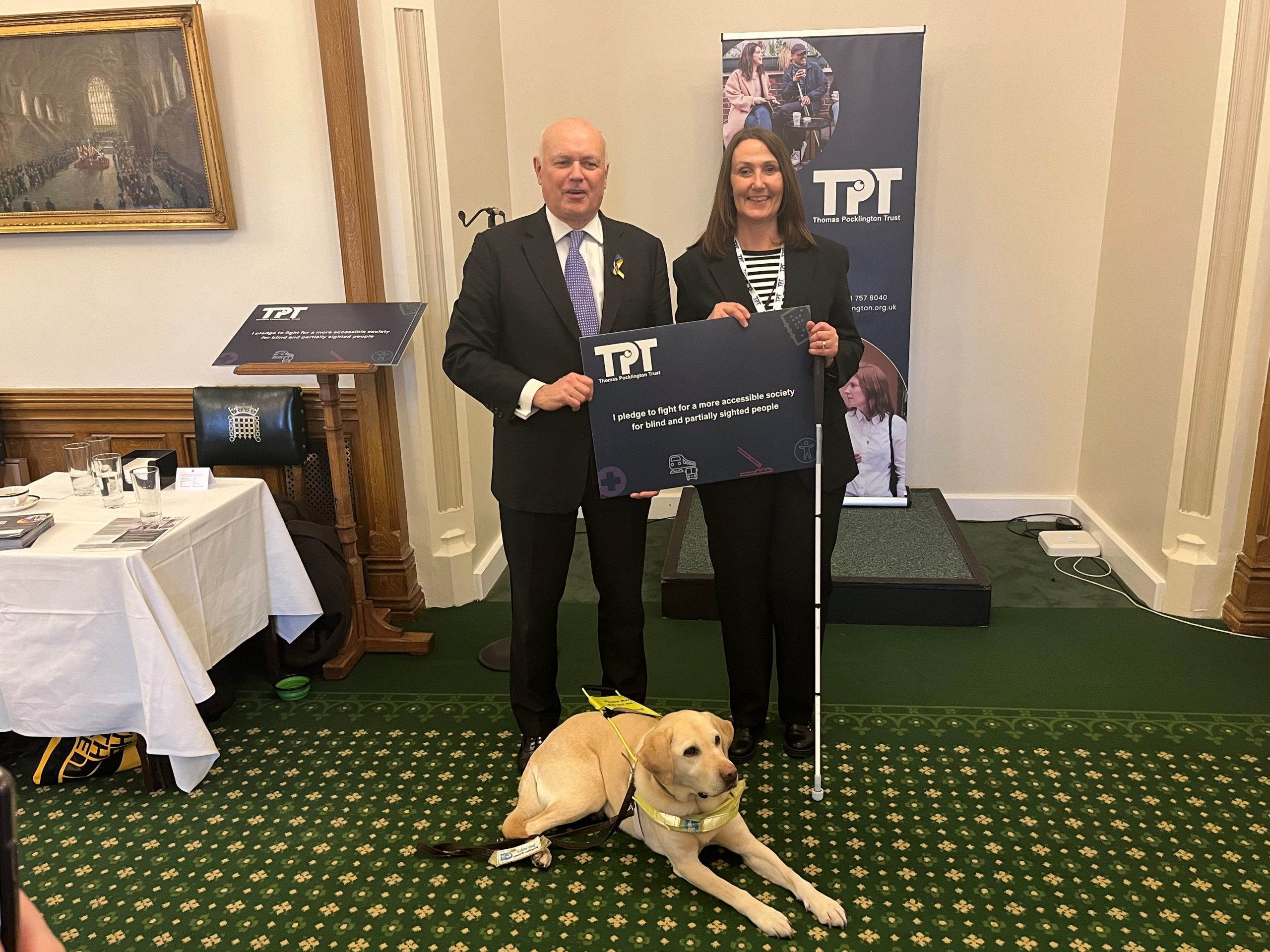
Iain Duncan Smith, MP for Chingford and Woodford Green, with TPT’s Cathy Low and guide dog Anna
Accessible Built Environment
MPs were invited to wear sim specs and navigate around a stationary bike.
This activity sparked several conversations around street clutter, pavement parking, micro-mobility, and the challenges these cause BPS pedestrians.
Street furniture, pavement parking, and e-scooters are just some of the obstacles BPS people have to navigate in an increasingly cluttered environment.
Over 75% of blind and partially sighted people who took part in our Listening Month survey said the following:
“Street obstacles are a real hazard for me when walking and can cause accidents. For example, A Boards, overhanging vegetation and poorly placed street furniture.”
“E-scooters and e-bicycles can cause serious injury and nervousness to venture out locally, due to poor and inappropriate riding.”
Pavement surface quality was an issue for many people blind and partially sighted pedestrians alongside lack of action to resolve pavement parking.
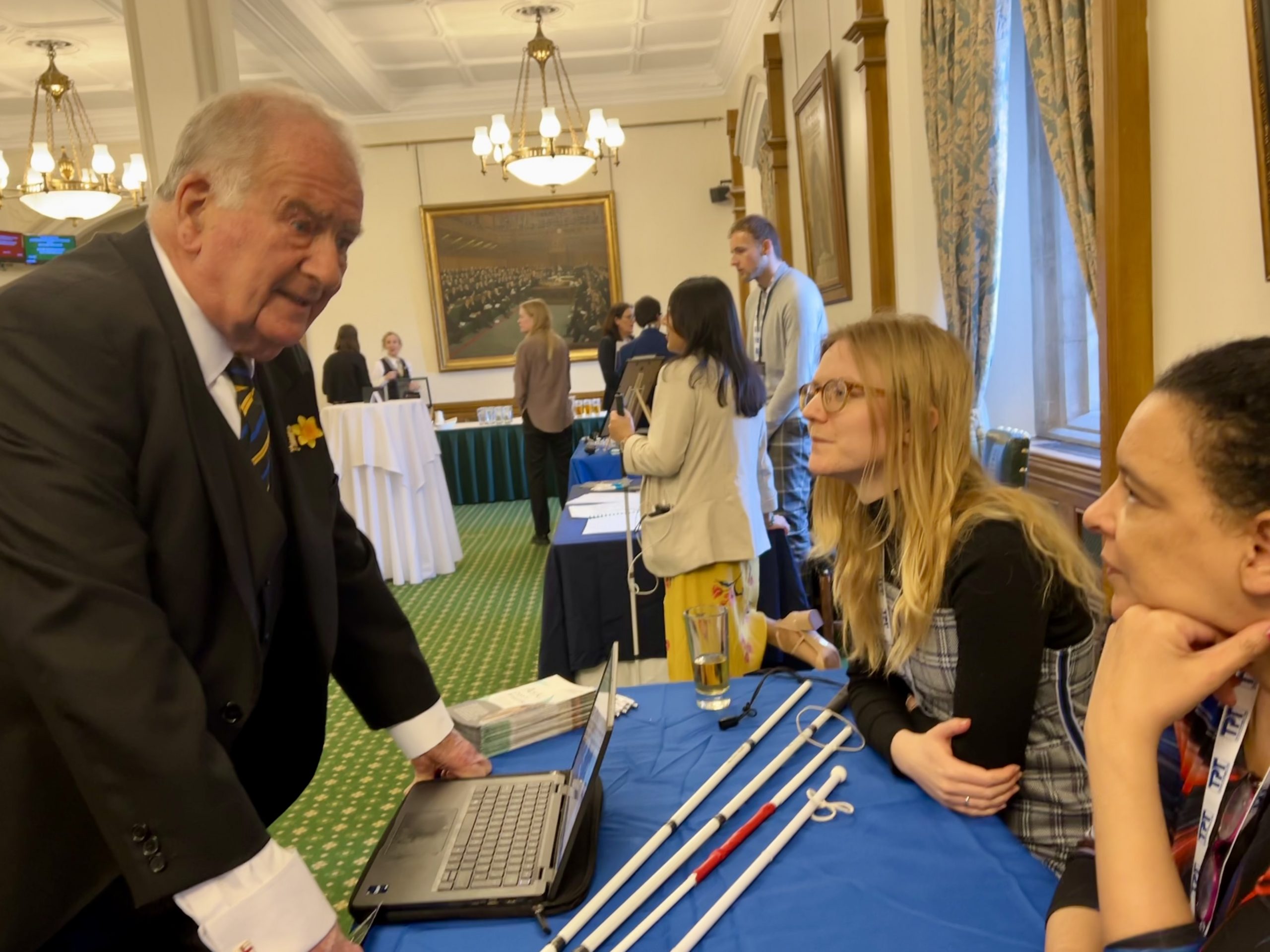
Sir Roger Gale, Deputy Speaker and MP, talking to Senior Engagement Manager, Lucy Williams, and SLC volunteer, Denise
Accessible Transport
Demonstrations were given on how apps and other technology can be used to plan, book journeys, and arrange assistance. It was highlighted how the majority of the apps are not accessible for BPS people.
We asked MPs to try to access timetable and station information whilst wearing sim specs or using voiceover or magnification. We also discussed our national campaign to #MakeTransportAccessible which is a priority for Sight Loss Councils (SLC) across the country.
Over 65% of blind and partially sighted people who took part in our Listening Month survey said:
- The lack of audio announcements on buses or the effectiveness of bus timetable information or apps, is a huge accessibility barrier.
- They had mixed experiences of passenger assistance services on rail services, with support not always available or delivered.
- The accessibility of booking services, particularly when using apps and for ticketing, was not consistent.
- Frequency of bus and rail services was unreliable, adding to the uncertainty of an already stressful journey. Delays or cancellations cause particular difficulties for blind and partially sighted people.
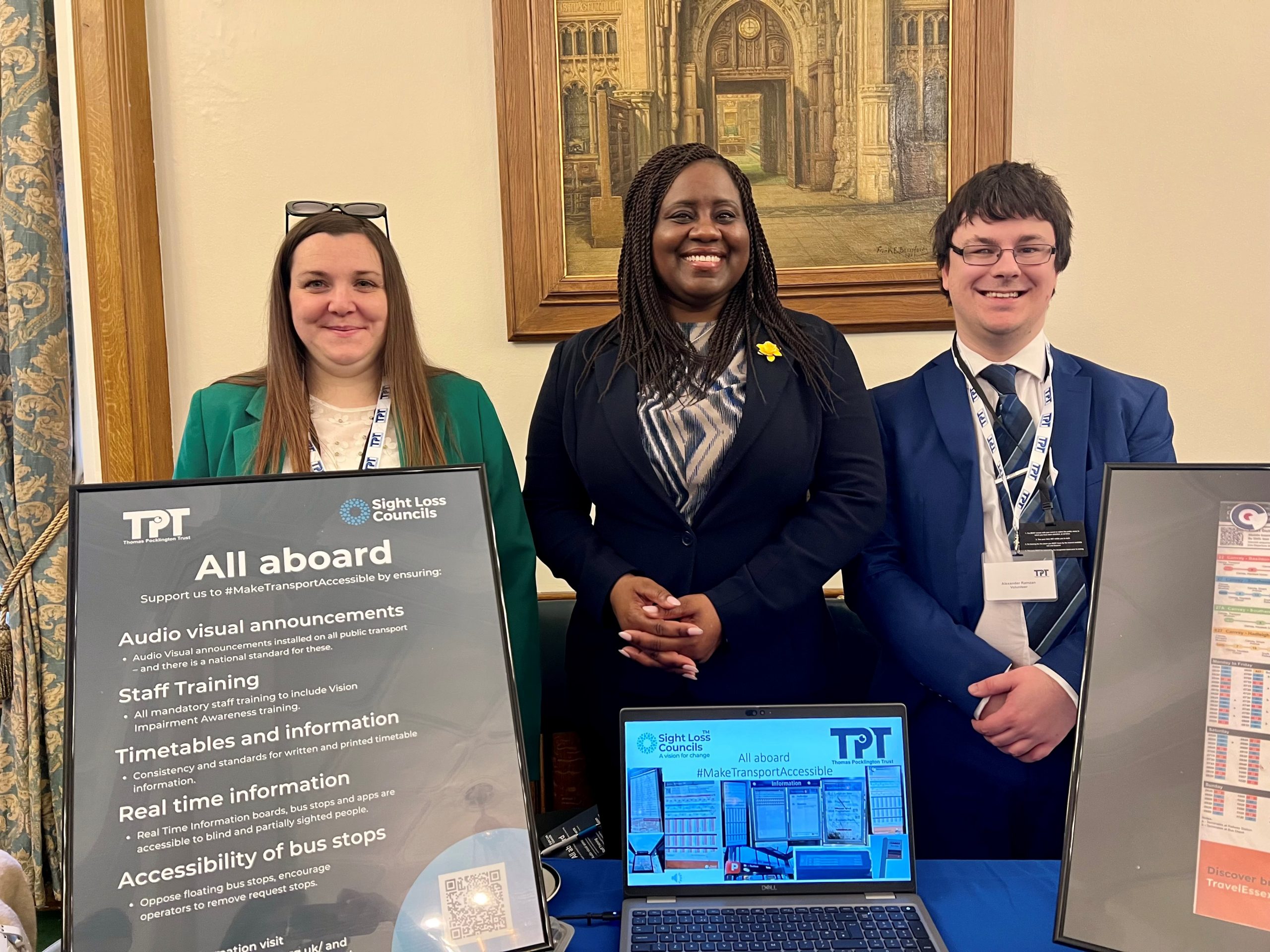
Samantha Leftwich, Engagement Manager for East England, Marsha De Cordova, MP, and Alex Ramzan, Essex SLC member
Accessible Health
MPs reviewed crucial healthcare documents, including appointment letters, diagnosis reports, updates on their condition, and consent forms, all while wearing sim specs.
BPS individuals frequently do not receive their health information in accessible formats. This is despite being legally entitled to it under NHS England’s Accessible Information Standard (AIS), which was implemented in 2016.
TPT’s research in 2021 showed that 90% of BPS people regularly fail to receive any information in their requested formats, with a third of this group saying they never had. 50% of the same cohort reported staff not even understanding why accessible information needs should be registered, implying both a poor grasp of AIS principles and generally low awareness.
Our #MakeHealthAccessible campaign is a national priority to ensure the AIS is reviewed and delivered appropriately. This entails regional health authorities logging patient’s access needs and using policies and training to execute the standard properly. Failure to do this risks severe consequences for BPS people such as missed appointments, mistakes with medication, using home test kits incorrectly, or being unable to read test results.
Sadly, the 2021 Freedom of Information report showed that 50% of NHS trusts had no AIS application policies.
Accessible Voting
MPs were asked to cast a vote in secret and access a ballot paper, wearing sim specs or a blindfold. Some used accessible devices which can help cast a vote confidently, such as a tactile voting device and a McGonagle Reader.
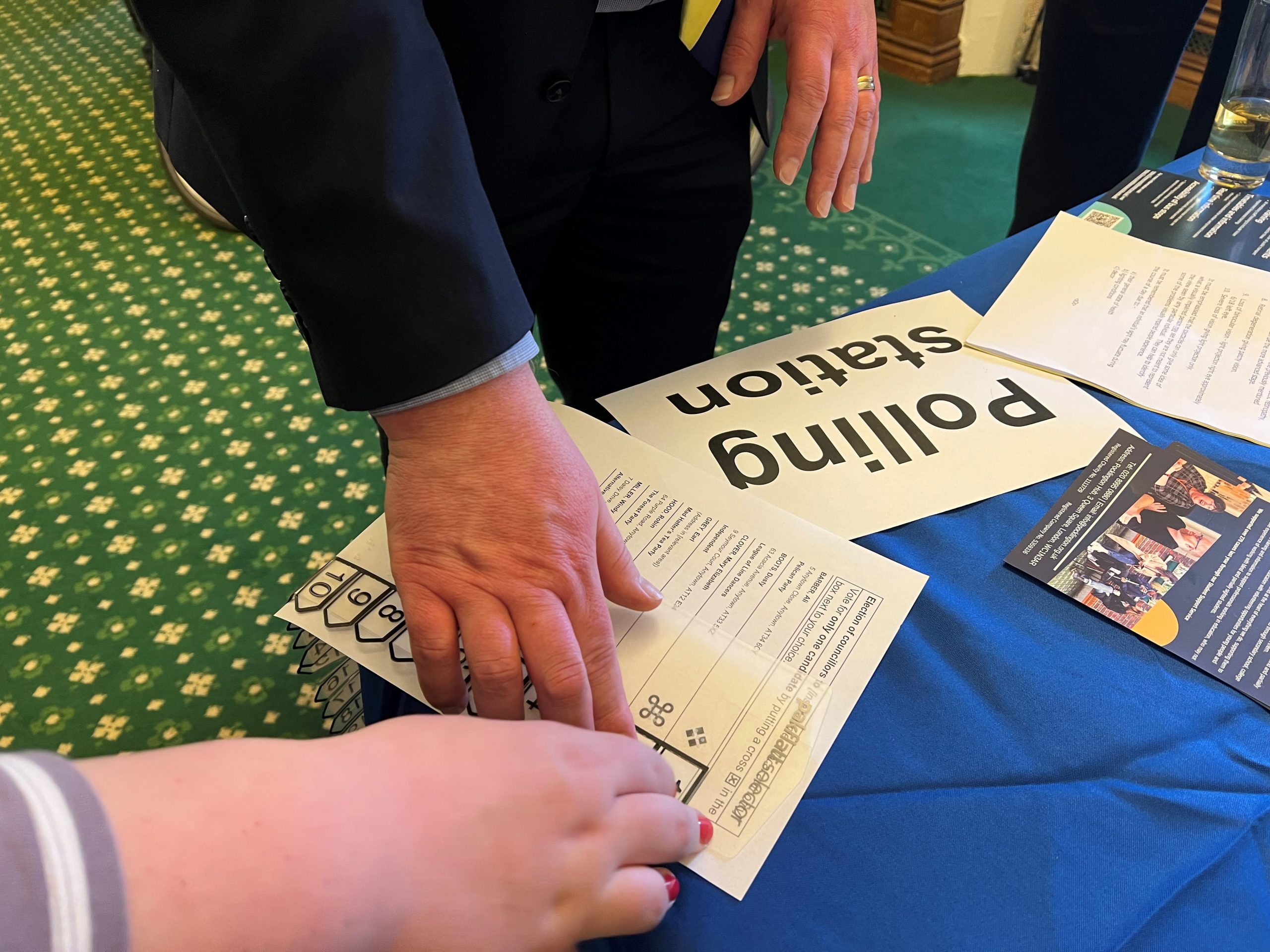
Close-up of Peter Gibson, MP, experiencing the McGonagle Reader at the Accessible voting station
Casting your vote is one of the most empowering things anyone can do. Millions of people vote every year and have their say on government, local issues, and the future of their area.
Despite the huge participation, many BPS people feel they aren’t able to vote independently and in secret.
Andy Law, a blind voter, said:
“Our event highlighted to MPs that inadequate provision still prevents thousands of blind and partially sighted people from making their ballot truly secret, and demand action to protect their democratic rights.”
Accessible Education
MPs had an opportunity to speak directly to one of Thomas Pocklington Trust’s student voice volunteers about their experience of education. They also engaged with assistive technology and modified education resources. This hands-on experience aimed to foster a deeper understanding of the unique needs associated with this low-incidence disability.
We used a range of tools and resources to support the activity – including adapted education teaching materials and assistive technology.
The choice of tools depended on the experience of the student voice volunteer as we wanted part of the activity to focus on their own experience in education.
We have long heard from BPS young people, their families, Further Education (FE) providers and local authority sensory impairment services that post-16 education support does not always work and the consequences for individuals can be significant.
Despite BPS learners achieving good GCSEs compared to other children with Special Educational Needs and Disabilities (SEND) groups, they are twice as likely to be Not in Education, Employment or Training (NEET) than the general population of 16 to 25 year olds. That should never be the case.
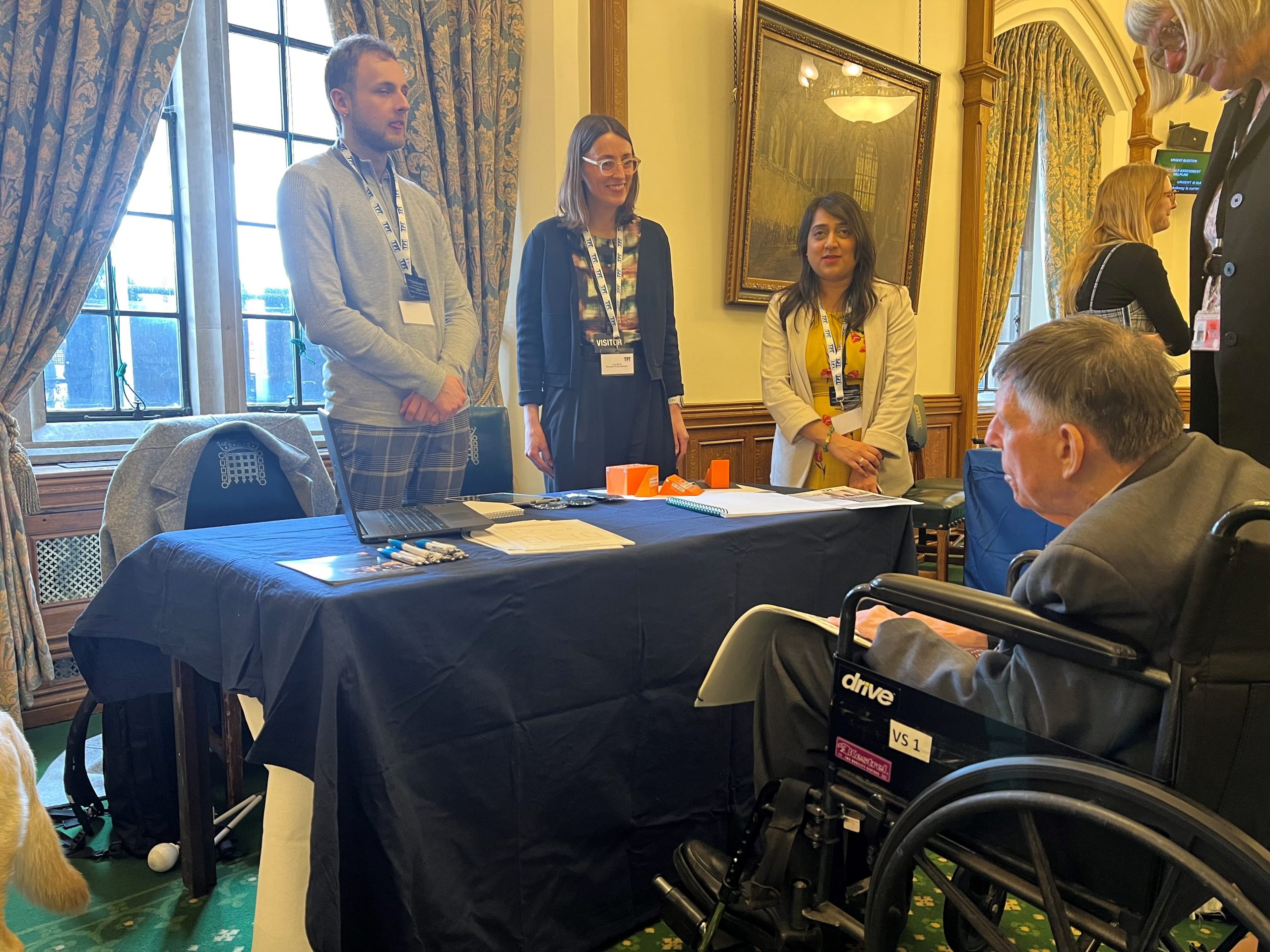
Lord Low of Dalston CBE. pictured talking to TPT’s education team
Accessible Employment
MPs had to complete and send an e-mail from one laptop to another, using assistive technology. We covered the laptop screens, forcing MPs to rely solely on assistive technology. Other resources or technology we used were blindfolds, and bump-on adapted keyboards and we provided information about touch typing.
Over 40% of BPS people who took part in our Listening Month survey said:
- The attitudes and understanding of employers and a lack of knowledge about the support available were poor.
- The concern about the complexity of access to work and generally poor knowledge of the specialist equipment available to enable visually impaired people to secure jobs.
- The benefits claims process was cited by many people as being complex and inaccessible.
Feedback from the event
MP Feedback
Dawn Butler, Labour MP for Brent Central, said:
“Sight loss is one of those things that will likely affect us all at some point.
“When you have the privilege of sight, you take it for granted. Society and the workplace should be accessible for anyone and we don’t enough.
“It is important to be allies and design society for everyone. Open spaces with no trip hazards. This is why the disability discrimination act is so important.”
Barbara Keeley, Labour MP for Worsley and Eccles South, said:
“I have campaigned on several of the issues raised here today, but I am particularly interested in the audio-visual announcements. This is really interesting as we are gradually buying and replacing a new bus fleet in Greater Manchester as we are taking over the running of the local bus network.”
Marco Lonhhi, Conservative MP for Dudley, tried sim specs. He said:
“The first thing that comes to mind is how scary it is. To go from full vision to it being seriously depleted is a big shock.
“The thing that springs to mind is how people lacking in confidence will be so affected going about their daily business with the challenges presented.”
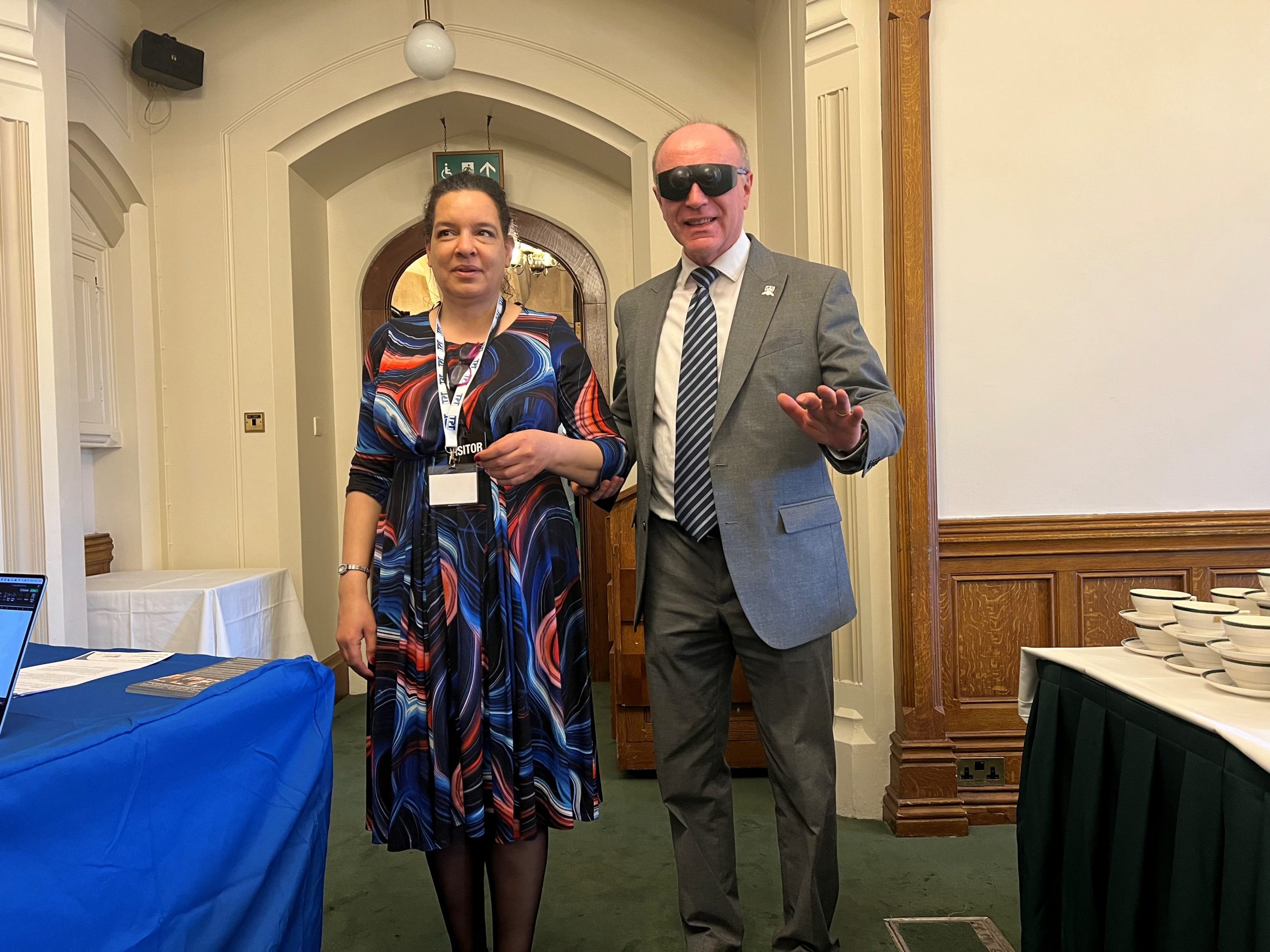
Marco Longhi, MP for Dudley, wore sim specs while being guided by SLC volunteer, Denise.
Alison Thewliss, SNP MP for Glasgow Central, said:
“I came along today as I heard that Sight Loss Councils are being rolled out in Scotland and I am very keen to find out more about how these work.
“The event has been very interesting. It’s great to hear about the work you are doing in different communities to support people with sight loss.”
SLC feedback
Cathy Low, Director of Partnerships, Thomas Pocklington Trust, said:
“We gave Members of Parliament (MPs) the chance to wear specially designed spectacles that simulate the most common sight loss conditions”
‘We were able to show them through lived experience why it is important to bring about change for accessible voting, health, built environment, transport’, education, and employment.”
Alex Ramzan, Essex SLC volunteer, said:
Samantha Leftwich, Engagement Manager for East England, said:
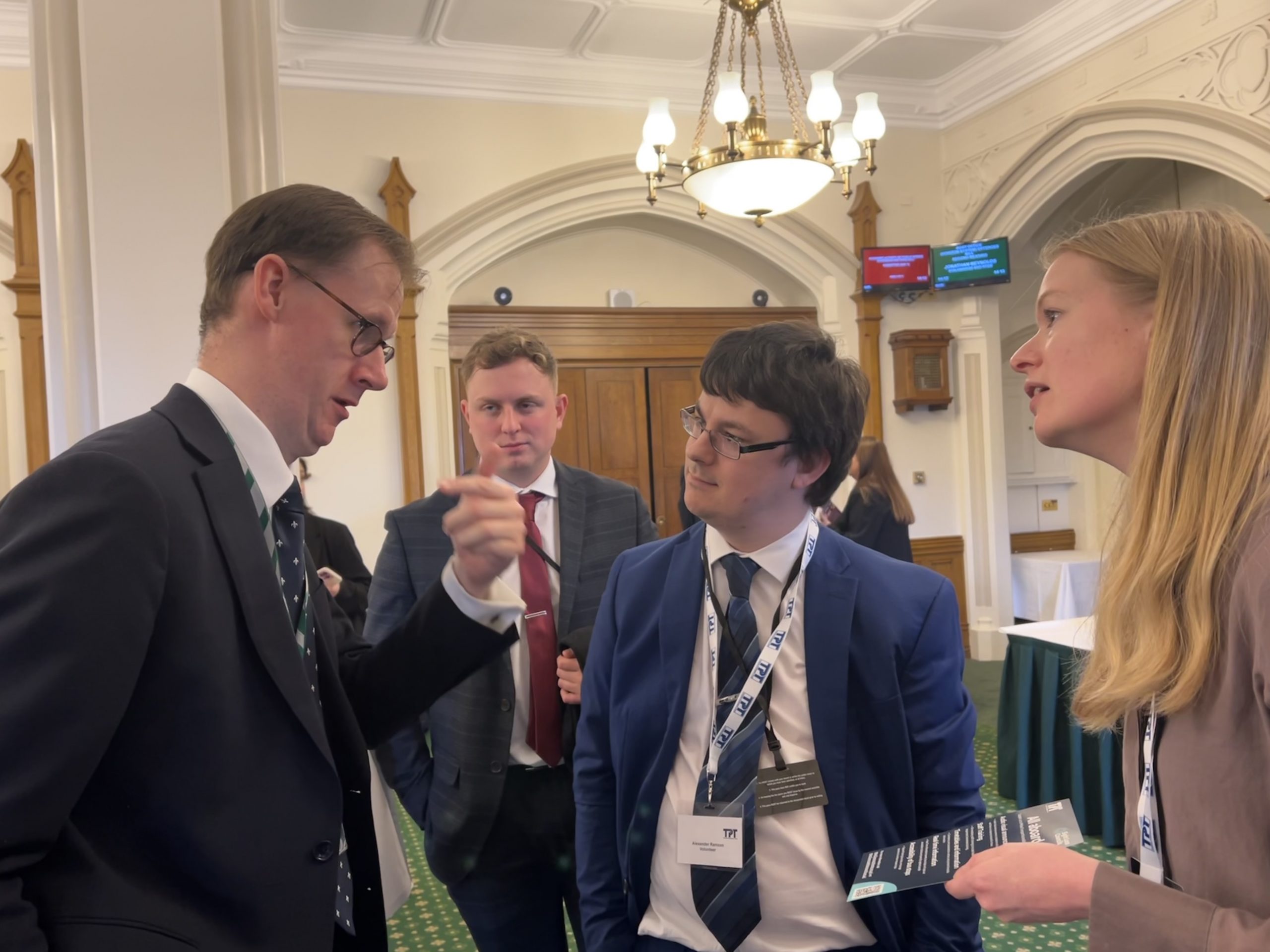
Tom Randall, MP, with Essex SLC member Alex, and support worker Lucy.
Stay in the know
Want to get involved in our national campaigns? Stay up to date with news from Sight Loss Councils and Thomas Pocklington Trust by signing up to our mailing list.
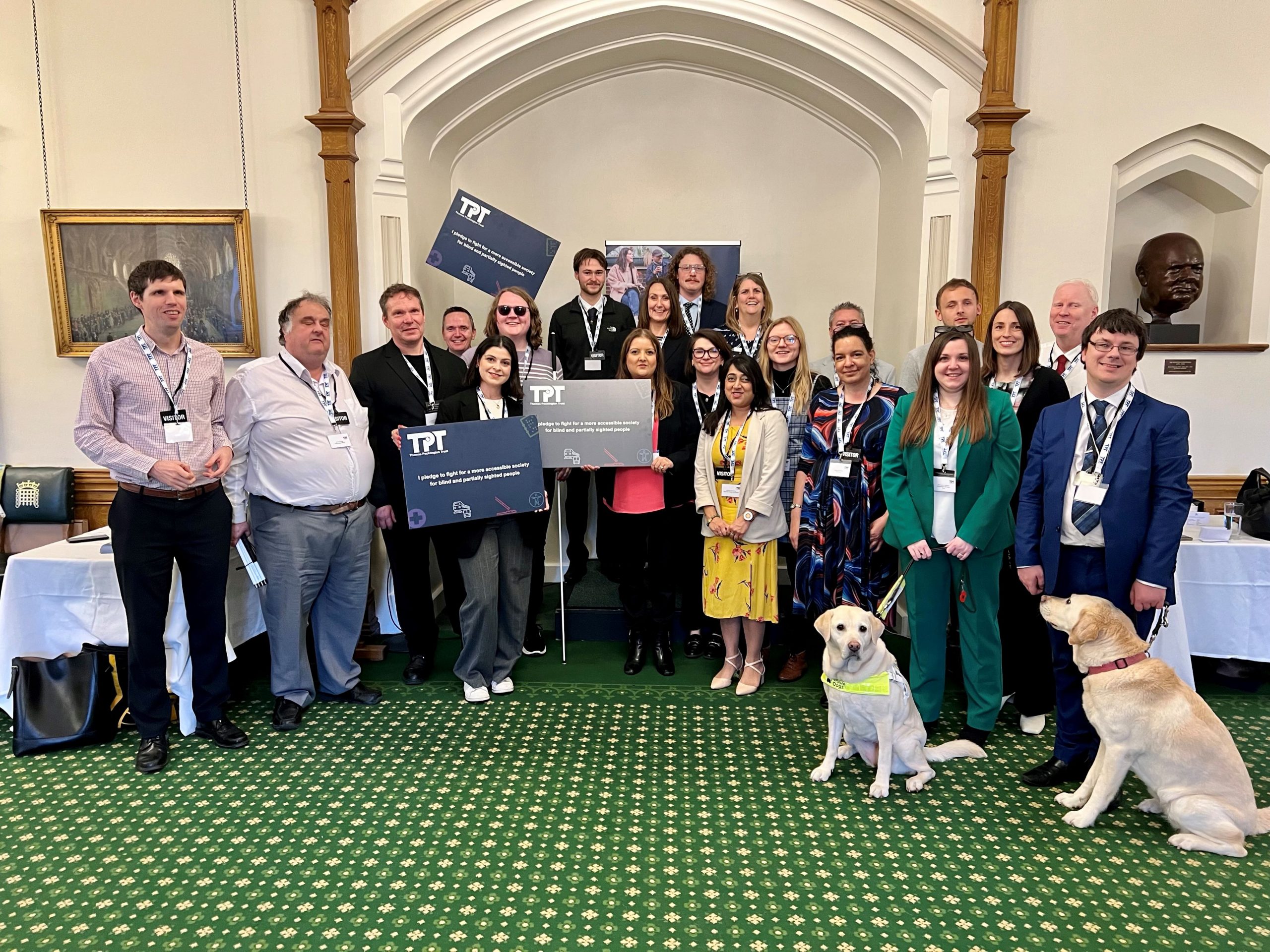
A group photo of all the staff, volunteers, and guide dogs who helped to make the event such a succes
Publication date: 22 March 2024

